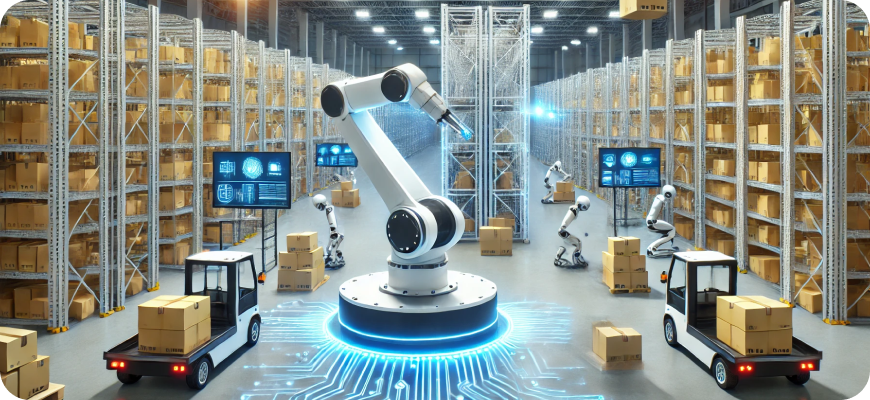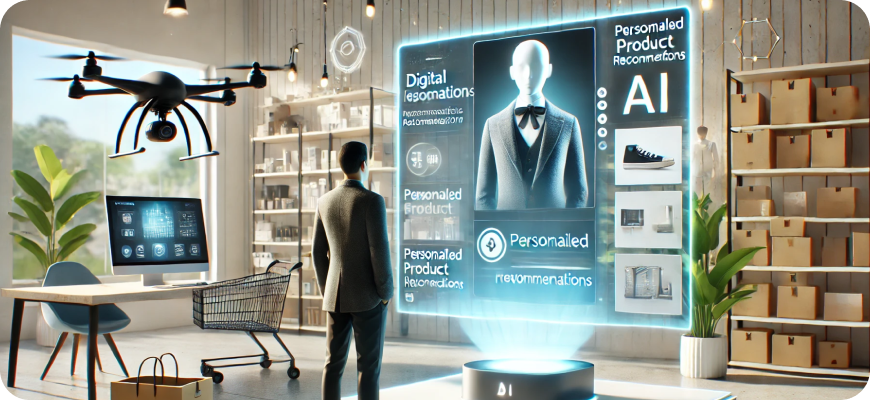How to Use AI in Your E-Commerce in 2025
The year 2025 represents an era where artificial intelligence (AI) has firmly entrenched itself in e-commerce, redefining customer experiences, streamlining operations, and driving profitability. E-commerce businesses leveraging AI stand poised to dominate the marketplace, transforming how they engage customers, manage supply chains, and make data-driven decisions. Here’s a deep dive into how you can use AI to revolutionize your e-commerce business in 2025.

1. Personalization at Scale
The modern consumer expects a tailored shopping experience. AI’s ability to analyze vast amounts of data and uncover patterns makes personalization more sophisticated and dynamic than ever before.
- Hyper-Targeted Recommendations: AI algorithms analyze browsing history, purchase behavior, demographic data, and even real-time preferences to deliver product recommendations tailored to each individual. These algorithms adapt and improve continually with data inputs.
- Dynamic Pricing Strategies: AI-driven dynamic pricing allows e-commerce platforms to adjust prices in real time based on demand, customer behavior, competitor pricing, and market conditions. This approach ensures you stay competitive without sacrificing profitability.
- Custom Content Creation: AI-powered tools can generate marketing content that resonates with each unique customer. From product descriptions to social media ads, AI-driven content can align with individual tastes and browsing history.
2. Chatbots and Virtual Assistants
AI-powered chatbots and virtual assistants have grown significantly in their ability to understand and respond to customers’ needs. By 2025, they can handle increasingly complex interactions, enhancing customer service capabilities.
- 24/7 Customer Support: Chatbots provide instant responses to queries, improving customer satisfaction. They can handle order tracking, product recommendations, returns, and refunds without human intervention.
- Multilingual Capabilities: E-commerce platforms can now serve a global customer base with AI-driven chatbots that automatically detect and communicate in different languages, breaking down language barriers.
- Conversational AI Sales Support: AI-powered assistants not only solve problems but proactively upsell and cross-sell, boosting sales through conversational marketing strategies.
3. Visual and Voice Search
In 2025, e-commerce shopping extends beyond typing text-based queries. AI’s role in visual and voice search has transformed the way consumers discover and shop for products.
- Visual Search Technology: AI-driven image recognition allows customers to search for products by uploading photos or screenshots. This technology recognizes colors, patterns, and product types, providing accurate matches that improve the user experience.
- Voice Commerce: Voice-activated devices like smart speakers make shopping as simple as speaking a command. AI algorithms interpret complex voice queries and present relevant product options quickly and accurately.
4. Predictive Analytics for Inventory Management
Efficient inventory management is a critical factor in e-commerce success. In 2025, AI predictive analytics take inventory management to the next level, minimizing stockouts and overstock issues.
- Demand Forecasting: AI analyzes historical sales data, market trends, promotions, and even weather patterns to predict demand accurately. This prevents excess inventory and ensures that in-demand products remain available.
- Supply Chain Optimization: AI-driven solutions streamline the supply chain, automating reordering processes, and identifying the fastest and most cost-effective shipping routes.
- Reduced Returns through AI Insights: By analyzing return data, AI identifies trends and root causes, enabling businesses to improve product quality, descriptions, and marketing to reduce returns.
5. Fraud Detection and Cybersecurity
With the increasing volume of online transactions, protecting customer data and preventing fraud is paramount. AI strengthens e-commerce security, reducing the risk of data breaches and fraudulent activities.
- AI-Powered Fraud Detection: Machine learning models detect unusual transaction patterns, flagging potentially fraudulent activity in real-time. As algorithms continue to learn, they become better at identifying anomalies and thwarting cyber threats.
- Secure Authentication Methods: AI enables biometric security measures such as facial recognition, fingerprint scanning, and behavioral analytics to secure customer accounts.
- Enhanced Data Privacy: AI systems can autonomously detect and address vulnerabilities in your website’s security infrastructure, ensuring compliance with data protection regulations.
6. AI for Marketing Automation
Marketing automation tools powered by AI help e-commerce businesses reach and engage with customers more effectively. AI handles repetitive tasks, personalizes communication, and maximizes the return on marketing spend.
- Email Campaign Optimization: AI analyzes user interactions to deliver tailored email content, optimize send times, and create campaigns that are more likely to convert.
- Programmatic Advertising: AI automates the buying and placement of ads to reach the right audience at the right time, maximizing ad spend efficiency. AI algorithms analyze user data and place bids on advertisements that align with your business goals.
- Customer Journey Mapping: AI tracks customer interactions across multiple channels and provides a holistic view of their journey. This insight allows you to tailor engagement strategies and nurture leads effectively.
7. AI-Enhanced Customer Reviews and Sentiment Analysis
Customer feedback is invaluable for any e-commerce business. AI automates the process of gathering, analyzing, and responding to customer reviews and feedback.
- Sentiment Analysis: AI can gauge the sentiment behind customer reviews, social media mentions, and other feedback channels, enabling e-commerce businesses to understand customer satisfaction levels and identify issues before they escalate.
- Automated Review Moderation: AI-powered moderation tools identify and filter spam or offensive content, maintaining the integrity of your review system.
- Real-Time Response Systems: AI tools can provide real-time responses to reviews and customer queries, showing a level of responsiveness that enhances brand trust.
8. Augmented Reality (AR) and AI
AI and AR work hand-in-hand to enhance customer experiences by allowing customers to visualize products before purchase. This leads to improved customer satisfaction and reduced return rates.
- Virtual Try-Ons: AI-powered AR solutions enable customers to try on clothing, accessories, or even view furniture in their homes before buying. This level of interactivity leads to higher purchase confidence and satisfaction.
- Interactive Product Customization: Customers can personalize products in real-time, using AI-driven AR interfaces. This not only enriches the shopping experience but also increases brand loyalty.
9. AI for Customer Retention
AI helps you retain customers by analyzing data, predicting their needs, and offering personalized solutions that keep them engaged.
- Predictive Churn Analysis: AI identifies customers who are likely to churn by analyzing their engagement and purchase data. E-commerce platforms can then employ targeted retention strategies to win them back.
- Loyalty Programs Optimization: AI analyzes which rewards drive the most customer engagement and loyalty, allowing businesses to tailor loyalty programs that resonate with their customers.
- Subscription Models: AI-powered recommendations encourage customers to subscribe to services or products that fit their needs, thereby increasing recurring revenue.
10. AI-Driven Product Development
AI doesn’t just help you sell more effectively; it can help you build better products. By analyzing market trends, customer reviews, and competitive data, AI can inform product development strategies.
- Trend Analysis: AI analyzes consumer preferences and market trends, giving businesses valuable insights into what customers want next.
- Product Quality Improvement: AI helps identify common complaints or product issues, enabling businesses to improve their offerings continuously.
- Crowdsourcing Feedback: AI platforms facilitate crowdsourcing feedback for new product launches, enabling data-driven design and feature optimization.
11. AI-Powered SEO and Content Optimization
AI-driven tools are essential for optimizing SEO strategies and content, ensuring e-commerce platforms rank highly on search engines and reach their target audiences.
- SEO Auditing Tools: AI continuously monitors search algorithms and provides real-time recommendations to optimize website content, ensuring consistent search rankings.
- Content Creation Optimization: AI analyzes keywords, audience preferences, and competition, helping to create content that ranks higher and engages readers more effectively.
- Voice Search Optimization: AI identifies patterns in voice search queries, enabling you to optimize content to match these trends.
12. Predictive Analytics for Sales Forecasting
AI’s predictive capabilities extend beyond inventory to sales forecasting, helping you anticipate trends and make data-driven decisions.
- Seasonal Trends Analysis: AI identifies and predicts seasonal spikes in demand, allowing for better planning and marketing strategies.
- Behavioral Segmentation: By segmenting customers based on their buying behaviors, AI can forecast demand from specific groups, making marketing campaigns more efficient.
13. Automation of Logistics and Delivery
AI streamlines logistics, ensuring faster and more reliable deliveries, which is critical for customer satisfaction in the competitive e-commerce landscape.
- Route Optimization: AI-driven tools optimize delivery routes in real-time, reducing costs and ensuring timely deliveries.
- Automated Warehousing: AI-powered robotics can automate picking, packing, and inventory management processes, increasing efficiency and reducing errors.

Conclusion
By 2025, the effective use of AI will be a prerequisite for success in the e-commerce industry. Leveraging AI’s capabilities to personalize customer experiences, streamline operations, and protect customer data sets businesses apart from the competition. The benefits span from enhanced customer satisfaction and loyalty to increased efficiency and profitability.
E-commerce businesses that embrace AI early and use it creatively are more likely to thrive. The future is AI-driven, and it brings an era of limitless possibilities, transforming how e-commerce operates and engages with customers. If you haven’t started integrating AI into your e-commerce business, now is the time to explore these revolutionary technologies and stay ahead of the competition.






